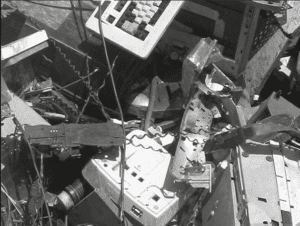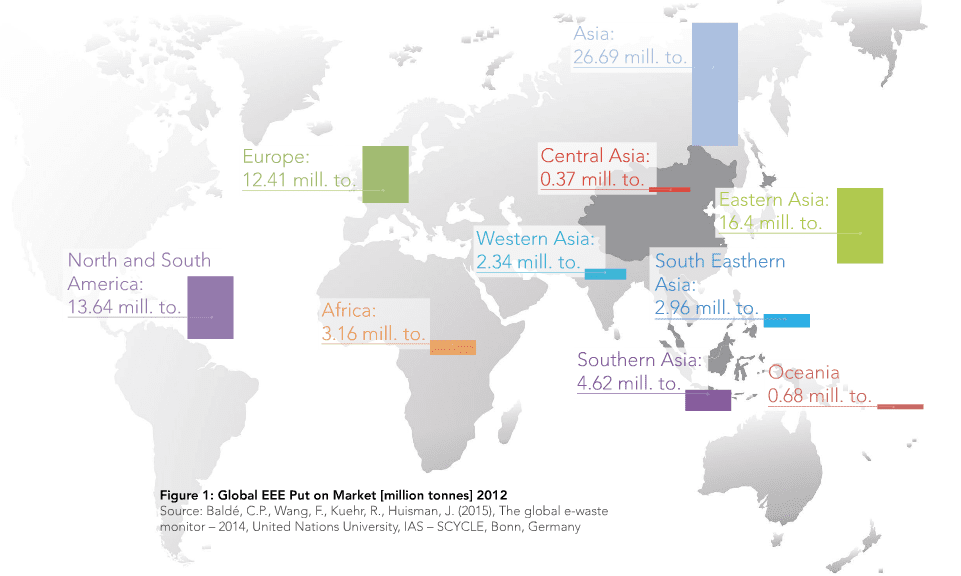Just as Asia’s middle class is rising, so too is Africa’s. The African Development Bank declared one third of the continent’s population as middle class in 2011, adjusting that figure from 300-million to 500-million people in the space of a year.
A further similarity was that bread-line concerns force waste pickers to engage in unsafe separation practice to retrieve small amounts of gold and copper from e-waste, an inefficient was to generate revenue. However, the report’s authors acknowledge the need to take the socio-economic conditions of different countries into account, suggesting that waste pickers could add value to the e-waste recovery value chain by being equipped with proper safety equipment and screwdrivers. Once e-waste is separated from the main fraction and physically taken apart, it can then be transported to better equipped e-waste recycling facilities. Purpose-built facilities would be capacitated to derive maximum value from the e-waste recycling process. Gadget reduction More and more products and appliances are being made to plug into mains power or run off batteries. If the demand for cheap gadgets in the kitchen, playroom and study doesn’t abate, the consequences for developing countries could be devastating. In many developed countries, legislation governing landfill construction makes provision for e-waste’s separation from the general fraction. In case of separation not being carried out efficiently, landfill lining systems are required to be robust enough to limit chemicals from crossing the barrier into groundwater and soil. However, developing countries can seldom afford such robust protection, and where landfill linings are required at all, affordability can become a more pressing imperative than minimising liner permeability. E-waste dumping ground While the Basel Convention of 1989 aims to prohibit the dumping of industrialised countries’ wastes onto industrialising countries, the report noted that, “As yet, only the minority of states around the globe have the necessary national and regional e-waste legislation in force.” To find out more on the effects of dumping e-waste in Africa, read ReSource magazine.
A report published by UN think tank, the UN University, has found that e-waste volumes in East and South-east Asia have rocketed by 63% in the last five years. The main culprit is China’s burgeoning middle class and its hunger for new electronic gadgets but there is a concerning parallel between the lack of regulation in many of the countries surveyed and similarly unregulated countries in Africa.
If regulation is not improved, rising contamination levels in water and soil could become a serious threat to human health in those countries that do not take appropriate regulatory steps.
Of course, there were wide divergences in e-waste recycling practices across the different territories surveyed in the report. These included: Cambodia, China, Hong Kong, Indonesia, Japan, Malaysia, the Philippines, Singapore, South Korea, Taiwan, Thailand and Vietnam.
Japan came out as a clear leader both as a producer of electrical and electronic equipment (EEE) and in its management of e-waste as a leader in early implementation of Extended Producer Responsibility principles. Taiwan and Korea also led in regards to their regulatory environments, being classed as ‘advanced’. Cambodia, Indonesia and Thailand were the least advanced countries in terms of their e-waste management, being classed as following only an ‘informal recycling initiative’.
BRICs giant China performed only marginally better, being described as ‘in transition.’
Report summary
The report looked at the role of the informal sector and health issues arising from a lack of regulation.
It was found that while the informal recycling sector could be quite efficient at removing e-waste from general landfill waste, a lack of access to proper safety equipment, such as gloves and goggles, and the use of unsafe separation methods, such as acid baths and open burning, caused waste pickers to be exposed to harmful compounds. Exposure caused a range of health problems, from skin irritation and difficulty breathing, to brain, kidney and reproductive dysfunction.
African parallels








